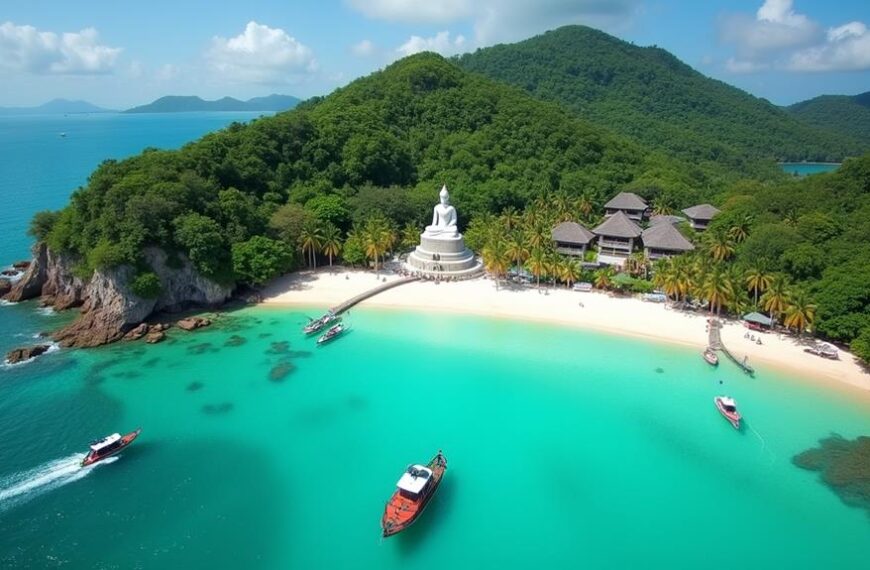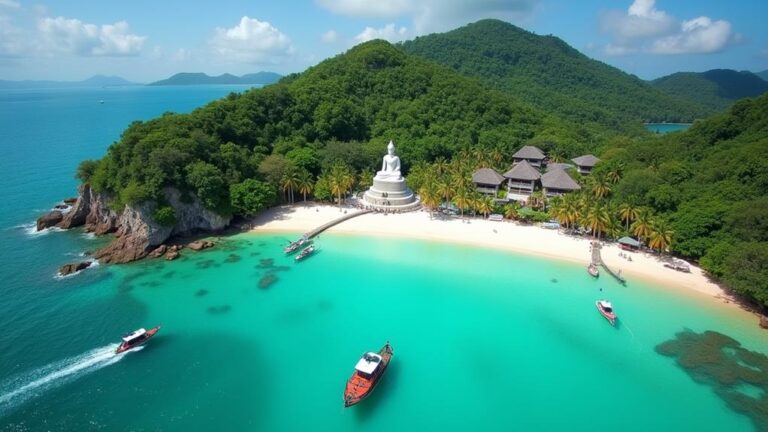Thailand managed to stay independent through a combination of strategic factors. Its geographical position as a buffer between British and French territories gave it leverage. You'll find that Thai leaders skillfully balanced diplomatic relations with colonial powers, making strategic compromises. They also implemented modernization reforms, strengthening the country's governance and military. Thailand preserved its cultural identity while adapting economically, focusing on trade and exports. The nation's military preparedness and international recognition of its sovereignty further bolstered its independence. These multifaceted approaches allowed Thailand to navigate the complex geopolitical landscape of the colonial era. Exploring each factor reveals a fascinating story of national resilience.
Table of Contents
Key Takeaways
- Thailand's strategic geographical position as a buffer between British and French territories aided its independence.
- Skillful diplomatic balancing and negotiations with colonial powers preserved Thailand's sovereignty.
- Modernization efforts and political reforms strengthened the country's governance and military capabilities.
- Preservation of cultural identity and promotion of nationalism fostered unity and resistance to foreign influence.
- Economic adaptability through trade relationships reduced dependency on colonial powers and bolstered Thailand's position.
Thailand's Strategic Geographical Position
Thailand's strategic geographical position played a pivotal role in its ability to maintain independence during the era of European colonization in Southeast Asia. Situated between British-controlled Burma and French-controlled Indochina, Thailand effectively served as a buffer zone between these two colonial powers. This unique geographical location provided the country with a natural defense against European encroachment, as neither Britain nor France wanted to risk conflict by attempting to colonize Thailand.
The Thai rulers recognized the importance of their country's position and leveraged it to their advantage. They focused on centralizing power in Bangkok, strengthening their military, and fostering a sense of nationalism among the Thai people. By emphasizing the Thai language and culture, they created a unified identity that helped resist foreign influence.
Additionally, the Siamese kings strategically modernized their political system and military to match European standards, making Thailand a less attractive target for colonization. This combination of geographical luck and strategic decision-making allowed Thailand to chart its own unique path to sovereignty, ultimately preserving its independence while neighboring countries fell under colonial rule.
Diplomatic Balancing Act
You'll find that Thailand's diplomatic balancing act hinged on creating a strategic buffer zone between British and French territories. This approach allowed Thailand to maintain neutrality and leverage its position to negotiate compromises with colonial powers.
Strategic Buffer Zone
A key factor in Thailand's preservation of independence was its strategic position as a buffer zone between British and French colonial territories. The Siamese kings skillfully leveraged this geographical advantage to maintain their sovereignty. By positioning Thailand as a buffer state, they effectively deterred direct colonization attempts from European powers.
The strategic buffer zone strategy was complemented by a diplomatic balancing act. Thailand's rulers paid tribute to stronger neighbors while carefully maintaining their independence. This approach, combined with the Mandala system, created a network of influence that bolstered Thailand's position. The table below illustrates the key elements of Thailand's strategy:
| Strategy | Purpose | Outcome |
|---|---|---|
| Buffer Zone | Deter colonization | Preserved autonomy |
| Diplomatic Balancing | Appease stronger powers | Maintained sovereignty |
| Mandala System | Create influence network | Protected independence |
| Geographical Advantage | Leverage location | Resisted imperialism |
Neutrality and Compromise
Sailing the treacherous waters of colonial expansion, Thailand's rulers employed a masterful strategy of neutrality and compromise. This diplomatic balancing act allowed the kingdom to maintain its sovereignty while neighboring countries fell under colonial rule.
Thailand's policy of neutrality was essential in avoiding direct involvement in major power conflicts in the region. By strategically balancing relations with colonial powers like France and Britain, the Siamese kings safeguarded their territorial integrity. They skillfully negotiated treaties and concessions with Western powers, preserving Thailand's independence and avoiding formal colonization.
The kingdom's ability to adapt to changing geopolitical landscapes proved crucial in its survival as a sovereign state. Skilled negotiators played a key role in maneuvering through turbulent times, engaging in diplomatic compromises when necessary. This approach allowed Thailand to make calculated concessions while retaining its core independence.
Modernization and Political Reforms

The modernization and political reforms undertaken by Thailand in the late 19th and early 20th centuries were essential to maintaining its independence. You'll find that these efforts, spearheaded by progressive monarchs like King Chulalongkorn, transformed Thailand's political and social landscape.
Central to these reforms was the centralization of power in Bangkok, which strengthened the nation's core and improved its ability to resist external pressures. This consolidation was accompanied by the introduction of a standing professional army, enhancing Thailand's military capabilities and deterring potential colonizers.
The transformation of Thailand's political system to a more Europeanized version was a strategic move. By adopting familiar governance structures, Thailand made itself more relatable to Western powers, reducing the perceived need for colonial intervention. This political modernization included reforms in administration, law, and education.
These changes weren't merely superficial. They fostered a sense of nationalism and emphasized the importance of knowledge and military strength. By strategically positioning itself as a buffer zone between British and French colonies, Thailand leveraged its geographical location to maintain sovereignty, demonstrating how modernization and political reforms can be powerful tools in preserving national independence.
Maintaining Cultural Identity
While modernization and political reforms were key to Thailand's independence, maintaining cultural identity proved equally essential. You'll find that Thailand's success in preserving its cultural heritage played a significant role in resisting colonization. The country's leaders strategically promoted traditional practices, emphasizing Theravada Buddhism and Hindu rites to foster a strong sense of national identity.
By establishing Thai as the official language, the country cultivated national pride and unity among its people. This linguistic cohesion strengthened Thailand's resistance to foreign influence and helped maintain its unique cultural character.
Additionally, the emphasis on map-making wasn't just about defining borders; it reinforced the concept of Thai sovereignty and territorial integrity.
The centralization of power in Bangkok, while stripping local rulers of authority, further solidified the state's unity. This consolidation of power allowed for a more cohesive national identity to emerge.
Economic Adaptability and Trade

From within the domain of economic strategy, Thailand's adaptability and focus on trade emerged as pivotal factors in maintaining its independence. The country's export-oriented economy, centered on products like rice, rubber, and gems, allowed Thailand to establish strong trade relationships and generate substantial revenue. This economic adaptability enabled the nation to leverage its resources and strategic location, reducing dependency on colonial powers.
You'll find that Thailand's ability to adapt to changing global economic trends played an essential role in its sovereignty. By engaging in international trade, the country could navigate geopolitical challenges and protect its interests.
Strategic trade agreements and diplomatic relations with various nations further bolstered Thailand's position on the world stage.
Under leaders like King Chulalongkorn, Thailand embraced economic reforms and modernization efforts. These initiatives strengthened the country's economy and helped resist colonial pressures. By continually adjusting its economic strategies and maintaining a focus on trade, Thailand successfully preserved its independence while many of its neighbors fell under colonial rule.
Military Strength and Preparedness
As Thailand sought to maintain its independence, military strength and preparedness emerged as vital elements of its strategy. Under King Chulalongkorn's reign, the country focused on building a professional, standing army to enhance its military readiness. This shift towards a modernized military structure proved essential in resisting European colonization attempts.
The centralization of power in Bangkok played a pivotal role in strengthening Thailand's military capabilities. By stripping local rulers of their powers, the government secured a more unified and efficient military structure. This centralized control allowed for better coordination and management of military forces throughout the country.
| Key Aspects | Benefits | Outcomes |
|---|---|---|
| Professional Army | Enhanced Readiness | Improved Defense |
| Centralized Power | Efficient Command | Unified Strategy |
| Modernized System | Increased Capability | Independence |
Thailand's emphasis on military strength provided a significant advantage in maintaining its sovereignty. The introduction of a modernized army system helped the country resist foreign pressures and preserve its independence. By investing in military readiness and adapting to changing geopolitical landscapes, Thailand successfully navigated the challenges posed by European colonial powers, ultimately safeguarding its autonomy and national identity.
International Recognition of Sovereignty

You'll find that Thailand's independence was solidified through diplomatic recognition from Western powers in the late 18th century. These treaties acknowledged Siam's sovereignty and established formal international relations.
Thailand's modernization efforts, particularly under King Chulalongkorn, further enhanced its standing on the global stage and demonstrated its capability as an independent nation.
Diplomatic Recognition Abroad
Securing diplomatic recognition from major Western powers proved necessary for Thailand's independence. Through strategic negotiations, Thailand signed key treaties like the Bowring Treaty with Britain and the Treaty of Amity and Commerce with the United States. These agreements not only solidified Thailand's status as a sovereign state but also protected it from direct colonization during the era of European imperialism in Southeast Asia.
You'll notice that Thailand's ability to maintain diplomatic relations with global powers played a pivotal role in protecting its territorial integrity. By skillfully balancing relationships with European colonial powers and pitting them against each other, Thailand successfully avoided becoming a formal colony. This diplomatic maneuvering was crucial in an era when Western nations were rapidly expanding their imperial reach.
Thailand's recognition as an independent nation was further strengthened by its strategic positioning as a buffer state between British and French colonies. This geopolitical advantage, combined with astute diplomacy, guaranteed Thailand's survival and sovereignty. The country's success in securing diplomatic recognition abroad stands as a sign of its adept navigation of complex international relations during a tumultuous period in Southeast Asian history.
Modernization Efforts Showcased
Thailand's modernization efforts played a pivotal role in showcasing its legitimacy as a sovereign state to European powers. Under the leadership of King Chulalongkorn, the country implemented key strategies to strengthen its position and assert its independence.
You'll find that centralization of power in Bangkok was essential to this process. By establishing a standing professional army and fostering nationalism, Thailand demonstrated its ability to maintain internal stability and defend its borders. These actions bolstered the country's sovereignty in the eyes of potential colonizers.
Thailand's emphasis on knowledge production further solidified its state legitimacy. Through map-making, establishing Thai as the official language, and developing a national historiography, the country defined its territories and reinforced its national identity. This approach helped Thailand present itself as a modern, cohesive state.
The adaptation of the Mandala system as a political strategy proved particularly effective. By creating a buffer zone between British and French colonies, Thailand enhanced its strategic position and maintained its independence. This clever maneuvering, combined with Thailand's Europeanized political system and military strength, ultimately helped the country avoid colonization.











